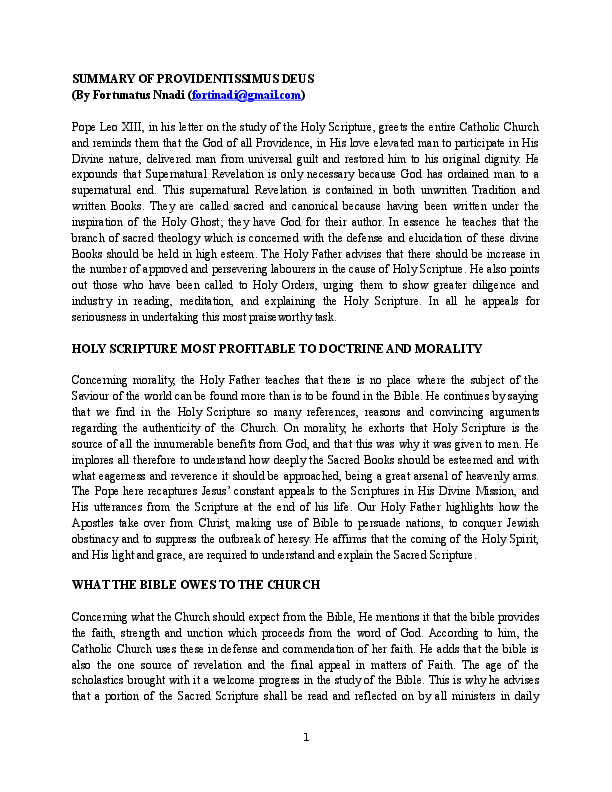Academia.edu no longer supports Internet Explorer.
To browse Academia.edu and the wider internet faster and more securely, please take a few seconds to upgrade your browser.
SUMMARY OF PROVIDENTISSIMUS DEUS
SUMMARY OF PROVIDENTISSIMUS DEUS
Related Papers
2022 •
Andrews University Seminary Studies (AUSS)
Handbook of Catholic Theology [review] / edited by Wolfgang Beinert, Francis Schüssler Fiorenza1997 •
Fr. Stăniloae wrote an ecclesiology based on the Holy Scriptures and invited Orthodox theologians to open sobornicity, namely the acceptance of the various ways in which God manifests himself outside of Orthodoxy, in order to have a more complete understanding of divine revelation. Revelation—and especially the Scriptures—is entrusted to the Church. At the same time, however, the Church has the duty to remain within the truth of the Scriptures. Dissentions within the Church are symptomatic of the tension between the authority of the Scriptures over the Church and the interpretative authority of the Church in regards to the Scriptures. Both the orthodox and the heretics of the early centuries claimed to interpret the Scriptures under the inspiration of the Holy Spirit, unanimously within their communities; is it possible to find an external criterion to establish who was right? Presenting the difference between the orthodox truth and the teachings of the other communities, Fr. Stăniloae affirmed that the Church must not search for an objective, exterior criterion for the truthful affirmation of its teachings, such as papal authority or the predominantly literal biblical interpretation in evangelical Protestant churches. In Orthodoxy, after long periods of time, the entire Church (clergy and the people) listens to the voice of its common conscience, receives the inspiration of the Holy Spirit, and discerns how to remain faithful to the truth of Scriptures and Tradition, in continuity with the ways in which previous generations have lived the divine revelation. This process reflects the interior conscience of the Church, which sometimes takes a tacit form, while other times it is manifested in ecumenical synods, which have to be later received by the Church. Through his description of the authority of the Church, through his entire ecclesiology and through the way in which he interpreted the Scriptures in the spirit of the Fathers, of the Liturgy, and in dialogue with contemporary society, Fr. Stăniloae highlighted the biblical nature of the Church and the ecclesial nature of the Bible.
Folia Theologica et Canonica
75 YEARS OF THE ENCYCLICAL LETTER DIVINO AFFLANTE SPIRITU2019 •
The encyclical of Pope Pius XII, Divino afflante spiritu, has been called the „Magna Charta for biblical progress.” It was the official declaration of the fact that the Church accepted the use of the historical-critical method as the basis of Catholic exegesis, not only allowing it but almost prescribing the use of critical methods in Bible interpretation. It is worth reading also today, in search of valid interpretations of the biblical text in a totally new situation.
Theological Studies
Book Review: Fidelis Populus, Vorgeschichte Der Reformatorischen Busstheologie, from Shadow to Promise: Old Testament Interpretation from Augustine to the Young Luther1969 •
2018 •
Though we are five hundred years removed from the Reformation, Levering and Vanhoozer in, "Was the Reformation a Mistake? Why Catholic Doctrine is Not Unbiblical," reveal that this specific conversation has changed very little. But the tone and condition of the conversation have changed drastically. Protestants and Catholics are no longer enemies fighting to dominate Western Christianity. Instead, they find themselves as allies fighting to defend Western Christianity from a pervasive postmodern worldview. But even in the defense of their common ground, the core doctrines of the Catholic Church are unreconcilable, and still demand protest and reform. Therefore, it is the goal of this paper to defend Scripture as having supreme authority in its own interpretation, to affirm the positions of the reformers, and to reveal how the Catholic doctrine of Scripture was, and are still, unbiblical.
This essay examines the Catholic Church's position on the canon of Scripture in the 16th century. By summarizing the key issues and figures from Jerome up until the Council of Trent, it seeks to shed light on a confused and sensitive area of scholarship.
RELATED PAPERS
Thúc đẩy Thương lượng-Hòa giải trong Trọng tài quốc tế - ICC facilitating settlement in international arbitration
Thúc đẩy Thương lượng-Hòa giải trong Trọng tài quốc tế - ICC facilitating settlement in international arbitration2023 •
2014 •
2006 •
Lankesteriana
A new species of Eurystyles (Orchidaceae) is exposed by a fierce hurricane in Puerto Rico2021 •
Handbook on Decision Support Systems 1
Artificial Neural Networks in Decision Support Systems2008 •
2018 •
Archeologia Stargardu. Badania kwartału IX. Dawne parcele Targ Drzewny 19–21
Zapinka kolistaBiophysical Journal
Effect of Substrate Nanotopography and Chemistry on Cell Attachment and Population in Retinal Cell Cultures2012 •
arXiv (Cornell University)
Coexistence of ferroelectric and ferrielectric phases in ultrathin antiferroelectric PbZrO3 thin films2024 •
International Journal of Advanced Research
The Relationship Between Stress and Academic Performance of Female Medical Students in Almaarefa Collages, in Riyadh 2014-20152018 •
Cancer research
Nucleolar localization of the nucleophosmin-anaplastic lymphoma kinase is not required for malignant transformation1998 •
Clinica Chimica Acta
Components of biological variation in plasma haptoglobin: relationships to plasma fibrinogen and immune variables, including interleukin-6 and its receptor1995 •
2005 •
RELATED TOPICS
- Find new research papers in:
- Physics
- Chemistry
- Biology
- Health Sciences
- Ecology
- Earth Sciences
- Cognitive Science
- Mathematics
- Computer Science


 Fortunatus C . Nnadi
Fortunatus C . Nnadi